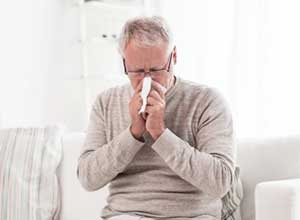
Older people (age 50 and up) and people of all ages with severe underlying health conditions seem to be at higher risk of developing serious COVID-19 illness. The CDC advises that it is “extra important” that persons with higher risk take action to help prevent exposure to the virus, and that all of us take actions to limit the spread in order to protect ourselves and those most vulnerable to complications.
The underlying conditions identified as increasing risk include but are not limited to:
Heart, kidney, or liver disease
Lung disease
Diabetes
Chronic bronchitis
Emphysema
Immune deficiency, or persons taking medications that suppress immune function
High blood pressure
Risk for more severe symptoms increases starting at approximately age 50 and continues to climb with age. According to the Robert Koch Institute, age combined with a risk factor creates higher risk as well. In particular, older persons may have a weaker immune response leading to more serious infection and a delay in some obvious symptoms such as fever. Thus older persons may not go to the doctor as early as a younger person with a stronger early response. Scientists are still learning about COVID-19, but the current known fatality rate in China for persons with COVID-19 below the age of 50 is below 1%, for ages 50-59 it is approximately 1.3%, for ages 60-69 it is approximately 3.5%, and for persons over 80 it is approximately 14.8%.
The CDC offers guidance for higher risk populations including:
Stock up on supplies
Take everyday precautions to keep space between yourself and others
When you go out in public, keep away from others who are sick, limit close contact and wash your hands often.
Avoid crowds as much as possible
During a COVID-19 outbreak in your community, stay home as much as possible.
For more specific guidance, visit www.cdc.gov/coronavirus/2019-ncov/specific-groups/high-risk-complications.html.















Reader Comments